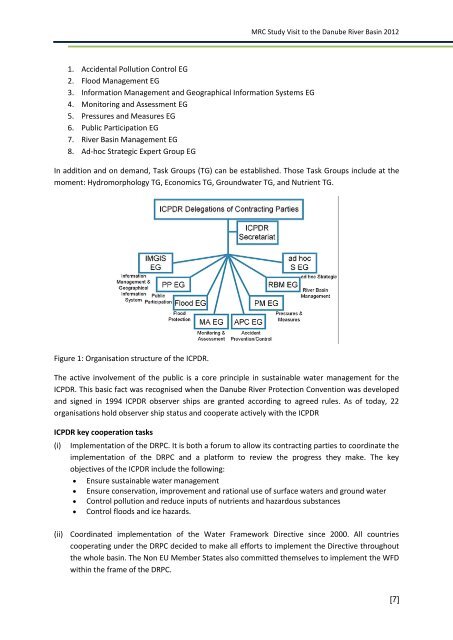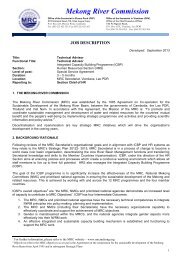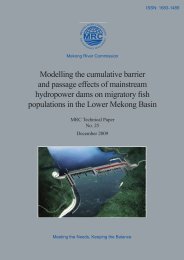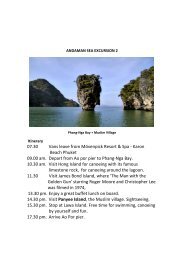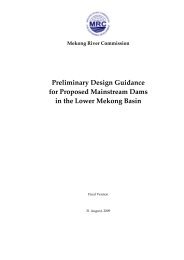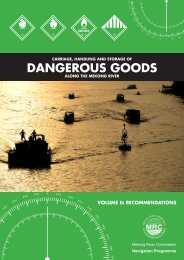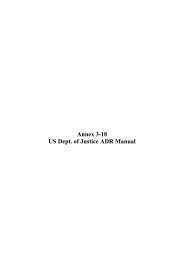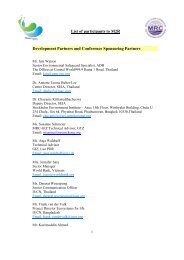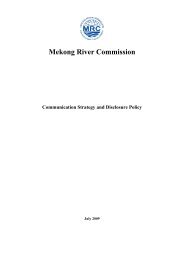evaluation of the study visit - Mekong River Commission
evaluation of the study visit - Mekong River Commission
evaluation of the study visit - Mekong River Commission
You also want an ePaper? Increase the reach of your titles
YUMPU automatically turns print PDFs into web optimized ePapers that Google loves.
1. Accidental Pollution Control EG<br />
2. Flood Management EG<br />
3. Information Management and Geographical Information Systems EG<br />
4. Monitoring and Assessment EG<br />
5. Pressures and Measures EG<br />
6. Public Participation EG<br />
7. <strong>River</strong> Basin Management EG<br />
8. Ad-hoc Strategic Expert Group EG<br />
MRC Study Visit to <strong>the</strong> Danube <strong>River</strong> Basin 2012<br />
In addition and on demand, Task Groups (TG) can be established. Those Task Groups include at <strong>the</strong><br />
moment: Hydromorphology TG, Economics TG, Groundwater TG, and Nutrient TG.<br />
Figure 1: Organisation structure <strong>of</strong> <strong>the</strong> ICPDR.<br />
The active involvement <strong>of</strong> <strong>the</strong> public is a core principle in sustainable water management for <strong>the</strong><br />
ICPDR. This basic fact was recognised when <strong>the</strong> Danube <strong>River</strong> Protection Convention was developed<br />
and signed in 1994 ICPDR observer ships are granted according to agreed rules. As <strong>of</strong> today, 22<br />
organisations hold observer ship status and cooperate actively with <strong>the</strong> ICPDR<br />
ICPDR key cooperation tasks<br />
(i) Implementation <strong>of</strong> <strong>the</strong> DRPC. It is both a forum to allow its contracting parties to coordinate <strong>the</strong><br />
implementation <strong>of</strong> <strong>the</strong> DRPC and a platform to review <strong>the</strong> progress <strong>the</strong>y make. The key<br />
objectives <strong>of</strong> <strong>the</strong> ICPDR include <strong>the</strong> following:<br />
� Ensure sustainable water management<br />
� Ensure conservation, improvement and rational use <strong>of</strong> surface waters and ground water<br />
� Control pollution and reduce inputs <strong>of</strong> nutrients and hazardous substances<br />
� Control floods and ice hazards.<br />
(ii) Coordinated implementation <strong>of</strong> <strong>the</strong> Water Framework Directive since 2000. All countries<br />
cooperating under <strong>the</strong> DRPC decided to make all efforts to implement <strong>the</strong> Directive throughout<br />
<strong>the</strong> whole basin. The Non EU Member States also committed <strong>the</strong>mselves to implement <strong>the</strong> WFD<br />
within <strong>the</strong> frame <strong>of</strong> <strong>the</strong> DRPC.<br />
[7]


